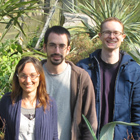
The proposal “Multi-level criticality as a principle of information processing: Towards an integrative theory of neuronal avalanches and oscillations‚ by Klaus Linkenkaer-Hansen was awarded with a grant of 213.532 € from the Physical Sciences, Netherlands Organization for Scientific Research (Vrije Competitie, Exacte Wetenschappen, NWO).
Klaus Linkenkaer-Hansen is PI of the Neuronal Oscillations and Cognition group in the CNCR’s Department of Integrative Neurophysiology. His research is focused on the complex dynamics of neuronal oscillations and its implications for cognition in health and disease. Theories and methods from the physics of self-organization and complexity is a source of inspiration in his multi-disciplinary research and also for the awarded project.
Linkenkaer-Hansen: “We have developed a computational model for studying neuronal organization on two levels: neuronal avalanches and oscillations. We hope to bring together disparate empirical findings in a unifying framework of criticality and explain how computations on different levels or neuronal organization relate to each other.‚ Integrating the currently separate fields raises the possibility that modulations in oscillations may be used as a proxy to predict changes in the dynamics of neuronal avalanches–and vice versa, which could have applications in the detection and treatment of brain disorders.
The modeling work will be performed by PhD student Richard Hardstone, who has a Masters degree in computer science from the Imperial College London, where he specialized in artificial intelligence. The empirical work in the research program will be carried out by postdoc Giuseppina Schiavone. She has a PhD in Biomedical Engineering from Campus Bio-Medico University of Rome.
Linkenkaer-Hansen: “With funding from CvB and the Neuroscience Campus Amsterdam committee “Integrative Analysis and Modeling‚, Richard produced the pilot results in the proposal. Getting the grant is a major credit for Richard’s work. We can now extend his contract with 3 years and make a nice PhD thesis of this project‚.
For more information please contact Klaus Linkenkaer-Hansen